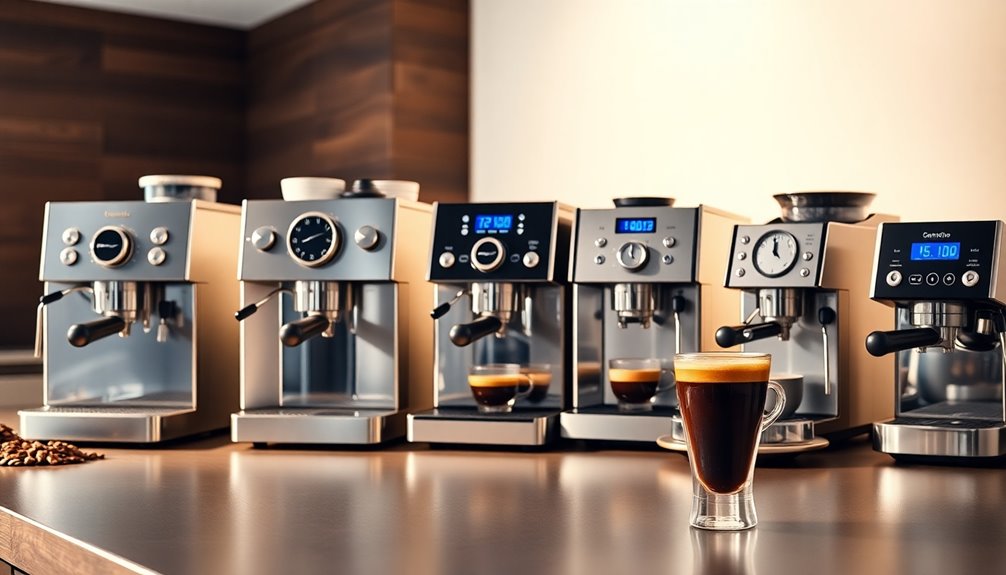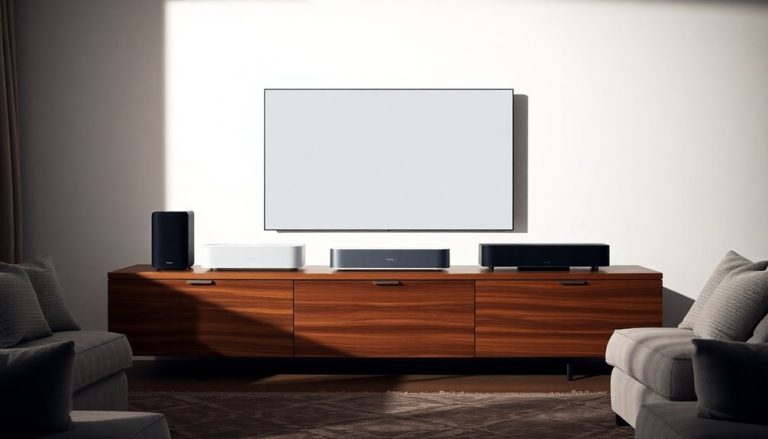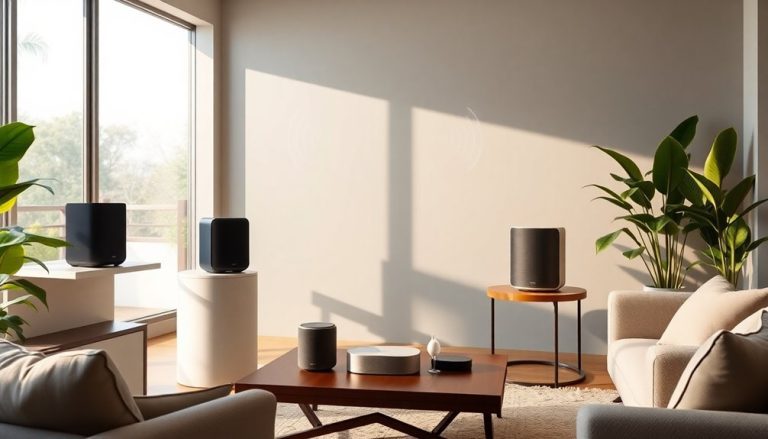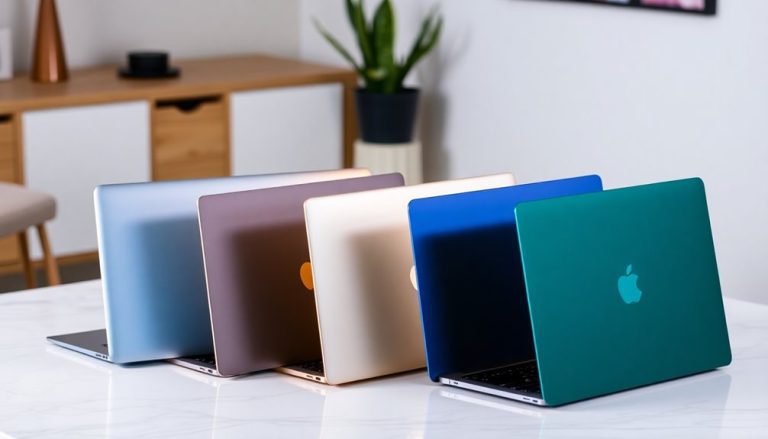You can brew barista-level coffee at home with the best espresso machines of 2025. Consider models like the CASABREWS Professional Espresso Machine, Breville BES870XL for its stainless steel design, and the DeLonghi Stilosa for a manual option. If you prefer convenience, check out the Espresso Machine with a 20-bar pump and auto milk frother, or the Gevi Professional for its versatility. When choosing, think about features like brewing pressure, milk frothing capabilities, and ease of maintenance. Each machine offers unique benefits that fit different preferences and kitchen spaces, so stick around to see how they can elevate your coffee game!
CASABREWS Professional Espresso Machine with Milk Frother
CASABREWS CM5418 Espresso Machine 20 Bar, Compact Espresso Maker with Steam Milk Frother, Stainless Steel Coffee Machine with 34oz Removable Water Tank for Cappuccino, Gift for Women or Men, Silver
(as of February 23, 2026 01:59 GMT +00:00 - More infoProduct prices and availability are accurate as of the date/time indicated and are subject to change. Any price and availability information displayed on [relevant Amazon Site(s), as applicable] at the time of purchase will apply to the purchase of this product.)The CASABREWS Professional Espresso Machine with Milk Frother stands out as the ideal choice for both coffee enthusiasts and casual drinkers alike, thanks to its powerful 20 Bar extraction capability and user-friendly design. This espresso maker features a compact, stainless steel appearance that fits perfectly in any home or office setting. With a 34 oz removable water tank, refilling is a breeze, allowing you to brew multiple cups without hassle. Its semi-automatic operation and 1350 W boiler ensure optimal extraction for that rich, velvety crema. Plus, the built-in pressure gauge lets you make personalized adjustments. Whether you crave lattes, cappuccinos, or macchiatos, this machine delivers consistent quality and delicious espresso every time.
Best For: Coffee enthusiasts and casual drinkers looking for a compact and user-friendly espresso machine that delivers high-quality beverages.
Pros:
- Affordable for the quality and performance, making it accessible for both beginners and experienced users.
- User-friendly design with intuitive controls and quick heating, simplifying the brewing process.
- Versatile brewing capabilities, allowing users to make a variety of coffee drinks like lattes, cappuccinos, and macchiatos.
Cons:
- Limited accessories included, with suggestions for additional items like a bottomless portafilter for enhanced brewing.
- Weight may be considered lightweight, but some users might prefer a sturdier feel.
- Semi-automatic operation may require some practice for optimal results, which could be a learning curve for beginners.
Breville BES870XL Espresso Machine, One Size, Brushed Stainless Steel
Breville Barista Express Espresso Machine BES870XL, Brushed Stainless Steel
(as of February 23, 2026 01:59 GMT +00:00 - More infoProduct prices and availability are accurate as of the date/time indicated and are subject to change. Any price and availability information displayed on [relevant Amazon Site(s), as applicable] at the time of purchase will apply to the purchase of this product.)Designed for coffee enthusiasts who crave café-quality espresso at home, the Breville BES870XL Espresso Machine stands out with its integrated precision conical burr grinder. This machine lets you grind fresh beans directly into the portafilter, ensuring optimal flavor extraction. You'll appreciate the low-pressure pre-infusion feature, which evenly draws out flavors, while the digital temperature control guarantees perfect brewing temperatures.
The powerful steam wand makes microfoam milk texturing easy, allowing you to create stunning lattes. Its intuitive design caters to beginners, so you'll quickly master your espresso-making skills. Plus, maintaining the machine is a breeze with its removable components and helpful cleaning reminders. With its elegant brushed stainless steel finish, it's not just functional; it's a stylish addition to your kitchen.
Best For: Coffee enthusiasts seeking to create café-quality espresso at home with ease and convenience.
Pros:
- Integrated grinder provides freshly ground coffee directly into the portafilter for optimal flavor.
- User-friendly design makes it accessible for beginners and ensures a quick learning curve.
- Elegant brushed stainless steel finish enhances the aesthetic appeal of any kitchen.
Cons:
- The machine may require regular maintenance to keep it functioning optimally.
- Some users may find the initial setup and calibration time-consuming.
- The steam wand can be tricky for those not familiar with milk texturing techniques.
DeLonghi Stilosa Manual Espresso Machine (EC260BK)
De'Longhi Stilosa Manual Espresso Machine, Compact Coffee Maker, 15 Bar Pump Pressure, Manual Milk Frother Steam Wand for Authentic Single & Double Espresso, Lattes & Cappuccinos, Tamper Included
(as of February 23, 2026 01:59 GMT +00:00 - More infoProduct prices and availability are accurate as of the date/time indicated and are subject to change. Any price and availability information displayed on [relevant Amazon Site(s), as applicable] at the time of purchase will apply to the purchase of this product.)For those who appreciate hands-on coffee crafting, the DeLonghi Stilosa Manual Espresso Machine (EC260BK) stands out as an excellent choice among the best home espresso machines of 2025. Its compact design fits perfectly in modern kitchens, while the 15 BAR pump pressure ensures rich espresso. You'll enjoy the manual operation, which gives you control over every brew, though it requires practice to master techniques like tamping and frothing. The machine includes a portafilter, tamper, and filters to get you started. Users rate it 4.3 out of 5 stars, praising the espresso quality and cost-effectiveness compared to cafes. While the learning curve exists, many find the experience rewarding as they create café-quality drinks at home.
Best For: Those who enjoy manual espresso-making and want to create café-quality drinks at home while learning the craft.
Pros:
- Great price point; cost-effective compared to frequent café visits.
- High-quality construction and performance with a rewarding user experience.
- Allows for customization of espresso drinks, enhancing creativity in coffee crafting.
Cons:
- Not automated; requires user involvement for brewing.
- Initial learning curve for optimal use, particularly with tamping and frothing.
- Does not include espresso shot glasses or a quality tamper; additional purchases necessary.
Espresso Machine 20 Bar with Auto Milk Frother
LERTIN Espresso Machine 20 Bar, Professional Espresso Maker With Auto Milk Frother, Home Compact Espresso Coffee Machine With Led Touch Screen, 61OZ Removable Water Tank For Latte, Cappuccino
(as of February 23, 2026 01:59 GMT +00:00 - More infoProduct prices and availability are accurate as of the date/time indicated and are subject to change. Any price and availability information displayed on [relevant Amazon Site(s), as applicable] at the time of purchase will apply to the purchase of this product.)Looking for a versatile espresso machine that delivers café-quality drinks right at home? The LERTIN Espresso Machine boasts a powerful 20-bar professional pump and an auto milk frother, making it perfect for crafting espressos, cappuccinos, and lattes. With its compact stainless steel design and a 61OZ removable water tank, it fits seamlessly into your kitchen. The LED touch screen simplifies operation, while the fast preheating and automatic shut-off features enhance convenience. Enjoy rich flavor thanks to the built-in temperature control and stable steam for frothing. Rated 4.4 out of 5 stars by users, it's a favorite for those seeking easy maintenance and great coffee. Just be mindful of the occasional filter removal challenge when hot.
Best For: Home coffee enthusiasts who desire a professional espresso experience with convenience and ease of use.
Pros:
- Produces café-quality espresso and other beverages with rich flavors.
- Compact and stylish stainless steel design fits well in small spaces.
- User-friendly LED touch screen and easy maintenance with removable components.
Cons:
- Difficulty with filter removal when the machine is hot.
- Steam function may sometimes produce watery froth.
- Some users have reported issues with water flow during brewing.
Gevi Professional Espresso Machine with Milk Frother
Gevi Commercial Espresso and Coffee Makers, Professional 20 Bar Espresso Maker with Milk Frother, Stainless Steel Expresso Coffee Machines for Home, Compact Cappuccino Machine, Great Gift
(as of February 23, 2026 01:59 GMT +00:00 - More infoProduct prices and availability are accurate as of the date/time indicated and are subject to change. Any price and availability information displayed on [relevant Amazon Site(s), as applicable] at the time of purchase will apply to the purchase of this product.)The Gevi Professional Espresso Machine with Milk Frother stands out as an excellent choice for coffee enthusiasts who want café-quality beverages right at home. With a powerful 20-bar pump and stainless steel construction, this compact machine fits perfectly in any kitchen. You'll appreciate the intuitive controls and semi-automatic brewing process, allowing you to make two espressos simultaneously. The steam wand froths milk effortlessly, and the removable nozzle simplifies cleaning. While some users mention concerns about plastic components, the machine's performance and value shine through, boasting a solid 4.4-star rating. Plus, with a 12-month warranty and lifetime tech support, you can buy with confidence. Enjoy a quick learning curve and impress friends with your barista skills!
Best For: Coffee enthusiasts seeking to create café-quality beverages at home with a compact and user-friendly espresso machine.
Pros:
- Produces high-quality espresso with a powerful 20-bar pump.
- Intuitive controls and semi-automatic brewing process make it easy to use.
- Includes a steam wand for effortless milk frothing and a removable nozzle for easy cleaning.
Cons:
- Some components are made of plastic, raising durability concerns.
- Users have reported a wait time after using the steam feature.
- Potential for scratches on surfaces if not cleaned regularly.
Factors to Consider When Choosing Home Espresso Machines
When you're picking a home espresso machine, there are several key factors to keep in mind. Consider brewing pressure requirements, the type of operation you prefer, and the machine's size and weight. Don't forget to check its milk frothing capability and water tank capacity to ensure it meets your coffee needs.
Brewing Pressure Requirements
In choosing a home espresso machine, understanding brewing pressure requirements is essential for crafting that perfect cup. The optimal brewing pressure typically ranges from 9 to 15 bars, with higher pressures often yielding richer flavors and better crema. If you're looking for consistency, consider machines that operate at 20 bars, as they ensure even saturation of the coffee grounds, leading to a more uniform extraction.
During the pre-infusion stage, a lower pressure of 1 to 4 bars is usually employed. This gradual approach helps extract flavors without risking over-extraction, which can spoil your espresso's taste. Remember, consistent brewing pressure is crucial; it directly impacts extraction time and the overall balance of flavors, making all the difference in achieving café-quality espresso at home.
When shopping for a machine, pay attention to the pump type. A high-quality Italian pump can provide the necessary pressure stability, ensuring that you get the best espresso possible. By keeping these brewing pressure requirements in mind, you'll be well on your way to enjoying barista-level coffee right from your kitchen.
Type of Operation
Choosing the right type of operation for your home espresso machine can significantly enhance your brewing experience. Espresso machines come in three main categories: manual, semi-automatic, and fully automatic. Each type offers a different level of control over the brewing process.
Manual machines require you to take a hands-on approach, giving you complete customization over your espresso shots. However, this often means a steeper learning curve, ideal for those who enjoy experimenting with their brew. If you're looking for a balance between control and convenience, semi-automatic machines might be your best bet. They combine user involvement with automated features like pre-infusion and pressure control, making them a popular choice for both beginners and seasoned enthusiasts.
On the other hand, fully automatic machines do all the work for you, automating everything from grinding to extraction. While this provides unparalleled convenience, it limits your control over the final brew. Ultimately, your choice of operation type will influence your brewing consistency, ease of use, and the level of expertise required to produce high-quality espresso. Consider your preferences and skill level when selecting the right machine for you.
Size and Weight
Considering the dimensions and weight of a home espresso machine can make a significant difference in your overall experience. Compact machines usually range from about 12 to 14 inches in height and width, making them ideal for smaller kitchen spaces. If countertop real estate is limited, opting for a smaller model can help you maintain a tidy, functional area.
Weight is another important aspect to consider. Many home espresso machines weigh between 8 to 10 pounds, which impacts portability and ease of storage. A lighter machine is easier to move and reposition, while a heavier one often signals sturdier construction and stability during operation. This stability is crucial when you're brewing that perfect cup of espresso.
Make sure the machine's size allows for comfortable access to controls and components. Some designs might be bulky or require extra space for attachments, which can hinder your brewing experience. Lastly, consider the overall footprint of the machine; it should fit comfortably alongside your other kitchen appliances without overcrowding your space. Balancing size and weight will help you choose a machine that suits your needs and lifestyle perfectly.
Milk Frothing Capability
Frothing milk effectively transforms your espresso drinks, making it a crucial factor when selecting a home espresso machine. Look for machines equipped with powerful steam wands; these are essential for creating microfoam milk, enhancing flavor, and enabling you to master latte art. If you enjoy customizing your drinks, a machine with a manual frother gives you more control over the milk texturing process, allowing you to adjust foam density and texture to your liking.
On the other hand, if you prefer convenience, automatic milk frothers can be a great choice. They provide a quicker, hands-off approach to frothing, though they may not offer the same level of customization as manual options. Pay attention to the size and adjustability of the frothing nozzle; a 360° adjustable nozzle makes frothing and cleaning easier.
Lastly, consider machines with built-in temperature control systems. These help maintain the milk at the optimal temperature for frothing, preventing scalding and ensuring the best flavor extraction. With these features in mind, you'll be well-equipped to choose a home espresso machine that meets your frothing needs.
Water Tank Capacity
Evaluating water tank capacity is essential when selecting a home espresso machine, as it directly impacts your brewing experience. A larger tank, like a 61 oz (1.8L), is perfect for busy households where you might need multiple shots in a row, especially during those hectic mornings. With a 34 oz tank, you can still brew several espressos, but you'll find yourself refilling it more often, which can interrupt your flow.
If you're considering a compact machine, remember that smaller water tanks might limit your ability to serve multiple guests or enjoy more than one cup yourself without constant refilling. Additionally, opt for machines with removable water tanks, as they simplify both refilling and cleaning, helping you maintain hygiene effortlessly.
Lastly, pay attention to the pressure pump system. Higher pressure systems often perform better with larger tanks, as they can sustain optimal brewing conditions for multiple shots. Choosing the right water tank capacity ensures you won't be left scrambling for a refill, allowing you to focus on enjoying your perfectly brewed espresso.
Build Quality Materials
When it comes to choosing a home espresso machine, the materials used in its construction play a crucial role in determining both performance and longevity. Stainless steel is often the top choice, thanks to its durability and resistance to corrosion. This not only enhances the machine's lifespan but also gives it an appealing aesthetic.
Pay close attention to components like the portafilter, boiler, and steam wand. These parts should be made from high-quality materials to ensure optimal heat retention and consistent brewing performance. If you notice plastic components, be cautious, as they may raise concerns about durability and potential contamination.
A robust construction significantly impacts your overall user experience, providing stability during use. The quality of materials also affects thermal stability, which is vital for maintaining the ideal temperature for espresso extraction and milk frothing.
Ease of Cleaning
Cleaning your home espresso machine can make a significant difference in its performance and longevity. When choosing a machine, look for models with removable components like drip trays and water tanks. These features simplify the cleaning process and allow for thorough maintenance. Machines equipped with steam wands that have detachable froth nozzles are also a smart choice, as they make it much easier to clean and reduce milk residue buildup.
Consider espresso machines that offer automatic cleaning cycles or reminders. These functions help maintain hygiene and prolong your machine's lifespan, saving you time and effort. Additionally, machines with stainless steel housing generally require less maintenance than plastic ones, which can stain or scratch easily.
Lastly, opt for a user-friendly design with intuitive controls. This enhances your overall cleaning experience by making disassembly and cleaning tasks less complex. By keeping these factors in mind, you can ensure that your home espresso machine stays in top condition, allowing you to enjoy barista-level coffee day after day.
Price and Value
Choosing the right home espresso machine involves balancing your budget with the features that matter most to you. Price ranges can vary significantly, from budget options around $100 to high-end models exceeding $1,000. It's crucial to assess your personal budget alongside the features you desire.
For machines under $300, you'll typically find semi-automatic options with essential features. If you're willing to invest between $500 and $800, you'll discover models equipped with built-in grinders and advanced brewing technology that enhance extraction quality. While upfront cost is important, consider longevity and maintenance costs as well; machines with good warranty support and readily available replacement parts often provide better long-term value.
You should also factor in the savings from making espresso at home versus frequent café visits, which can quickly add up to hundreds of dollars annually. Remember, a higher price point usually correlates with improved build quality and performance features, such as precise temperature control and pressure gauges, which can elevate your espresso-making experience. Balancing these factors will help you find the right machine that meets your needs without breaking the bank.
Frequently Asked Questions
What Is the Average Lifespan of a Home Espresso Machine?
The average lifespan of a home espresso machine typically ranges from 5 to 15 years, depending on usage and maintenance. With proper care, you can extend its life and enjoy great coffee for longer.
How Often Should I Descale My Espresso Machine?
Did you know that descaling your espresso machine can extend its lifespan by up to 30%? You should descale it every 1-3 months, depending on water hardness, to keep your coffee tasting great and your machine running smoothly.
Can I Use Pre-Ground Coffee With These Machines?
Yes, you can use pre-ground coffee with these machines. Just make sure it's fresh and suited for espresso. However, grinding your beans right before brewing typically results in a richer, more flavorful cup.
Are These Machines Suitable for Beginners?
Starting your espresso journey feels like stepping into a cozy café. These machines are designed with beginners in mind, offering user-friendly features that make brewing delicious coffee a breeze. You'll love the experience!
What Is the Ideal Water Temperature for Brewing Espresso?
The ideal water temperature for brewing espresso is between 190°F and 205°F. If you keep it within this range, you'll extract the best flavors from your coffee grounds, resulting in a rich, balanced shot.
Conclusion
Now that you've explored the top five espresso machines of 2025, imagine transforming your kitchen into a bustling café where the aroma of rich, velvety espresso dances through the air. You'll be the barista extraordinaire, crafting perfect lattes and frothy cappuccinos with the flick of a wrist! Whether you choose the sleek Casabrews or the charming DeLonghi, you're on the brink of a coffee revolution that'll have your friends begging for a taste of your divine brews. Cheers to coffee greatness!

































